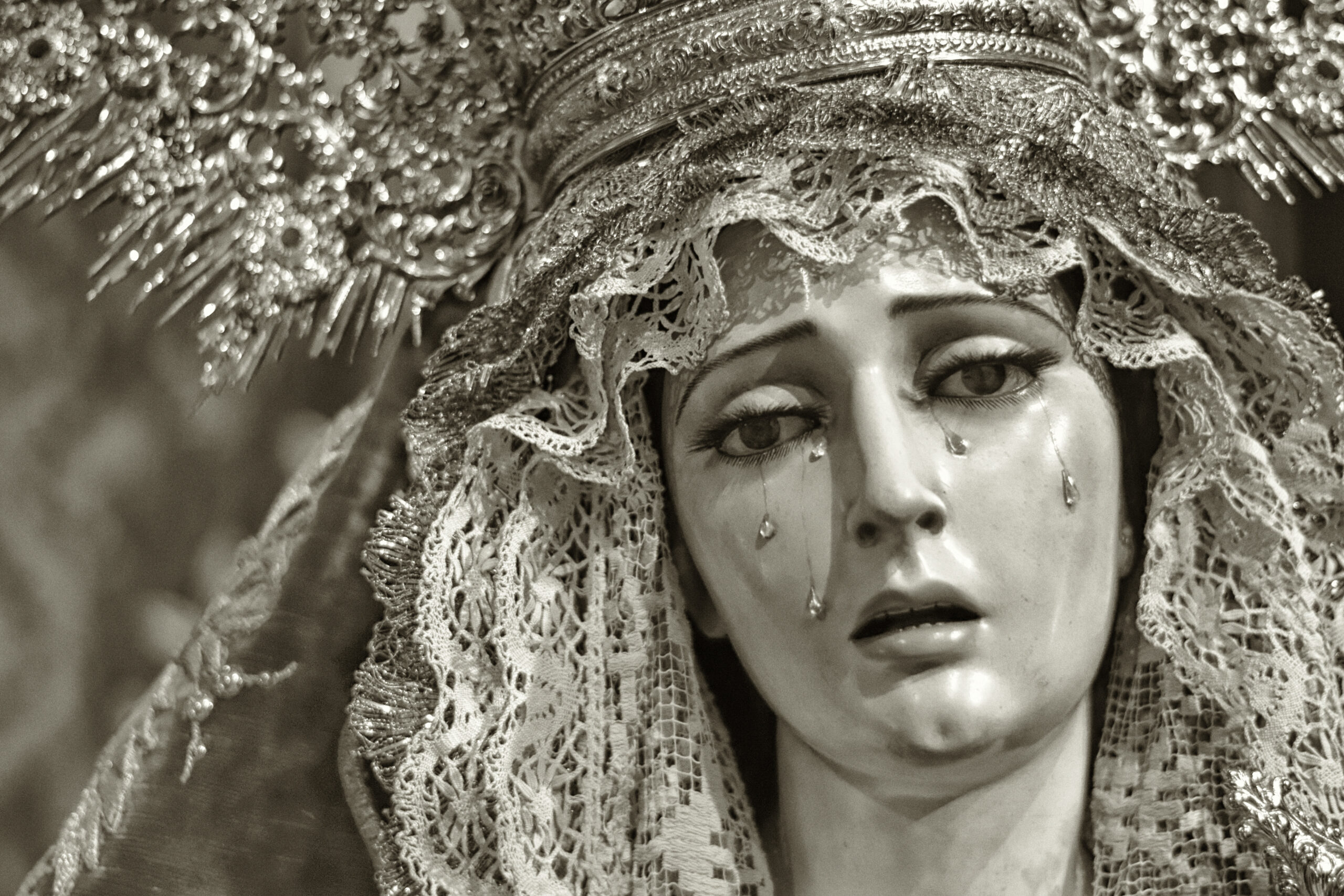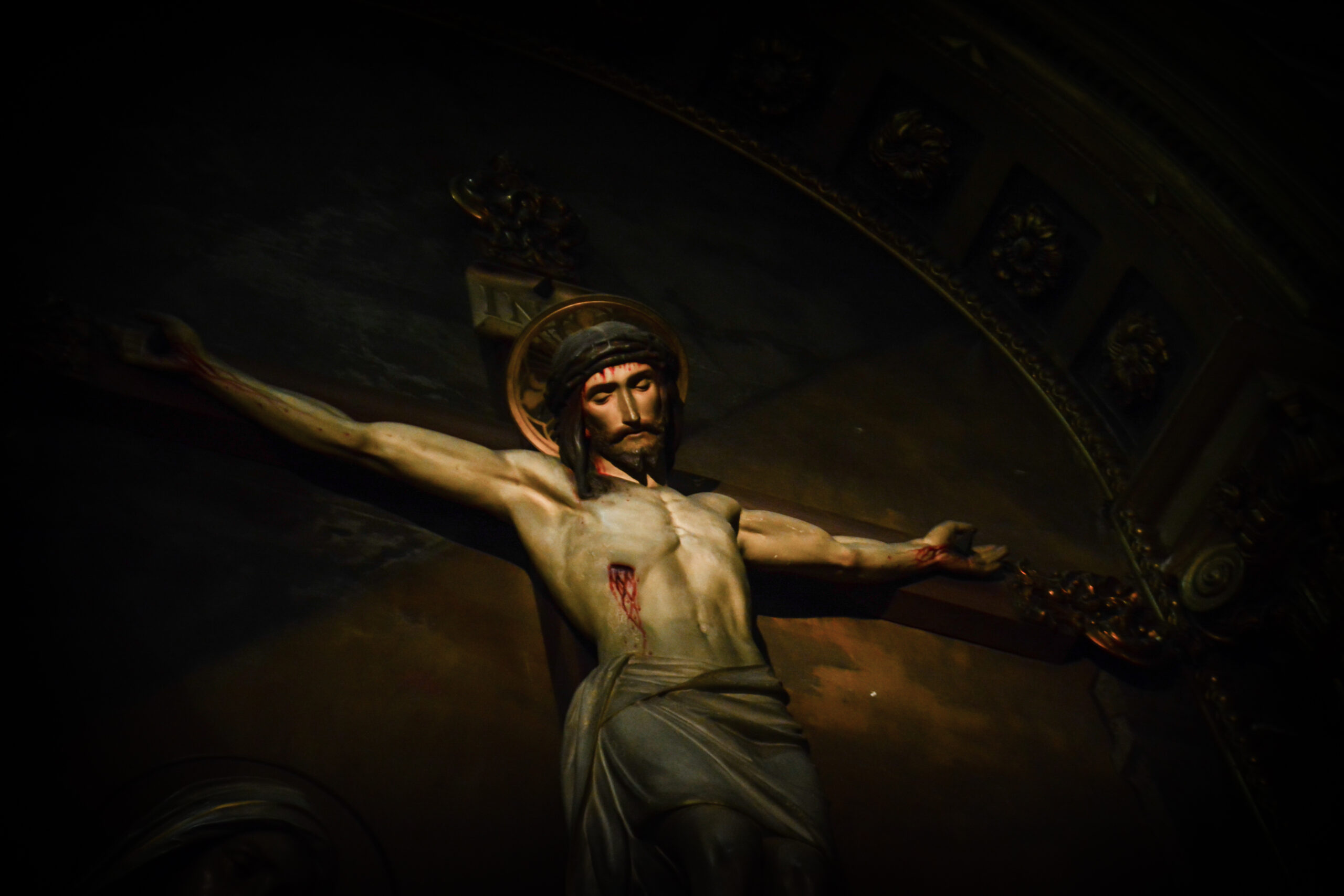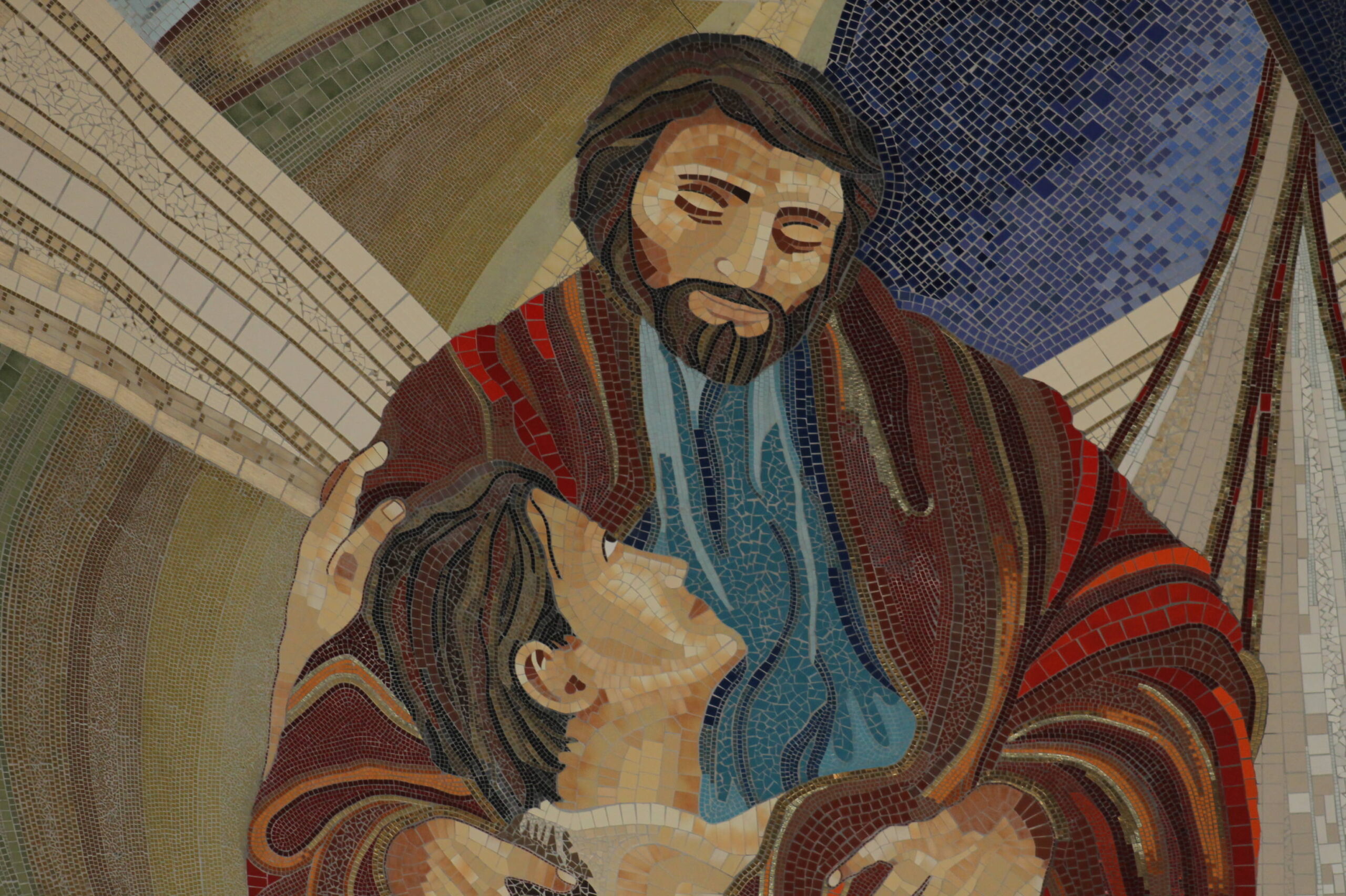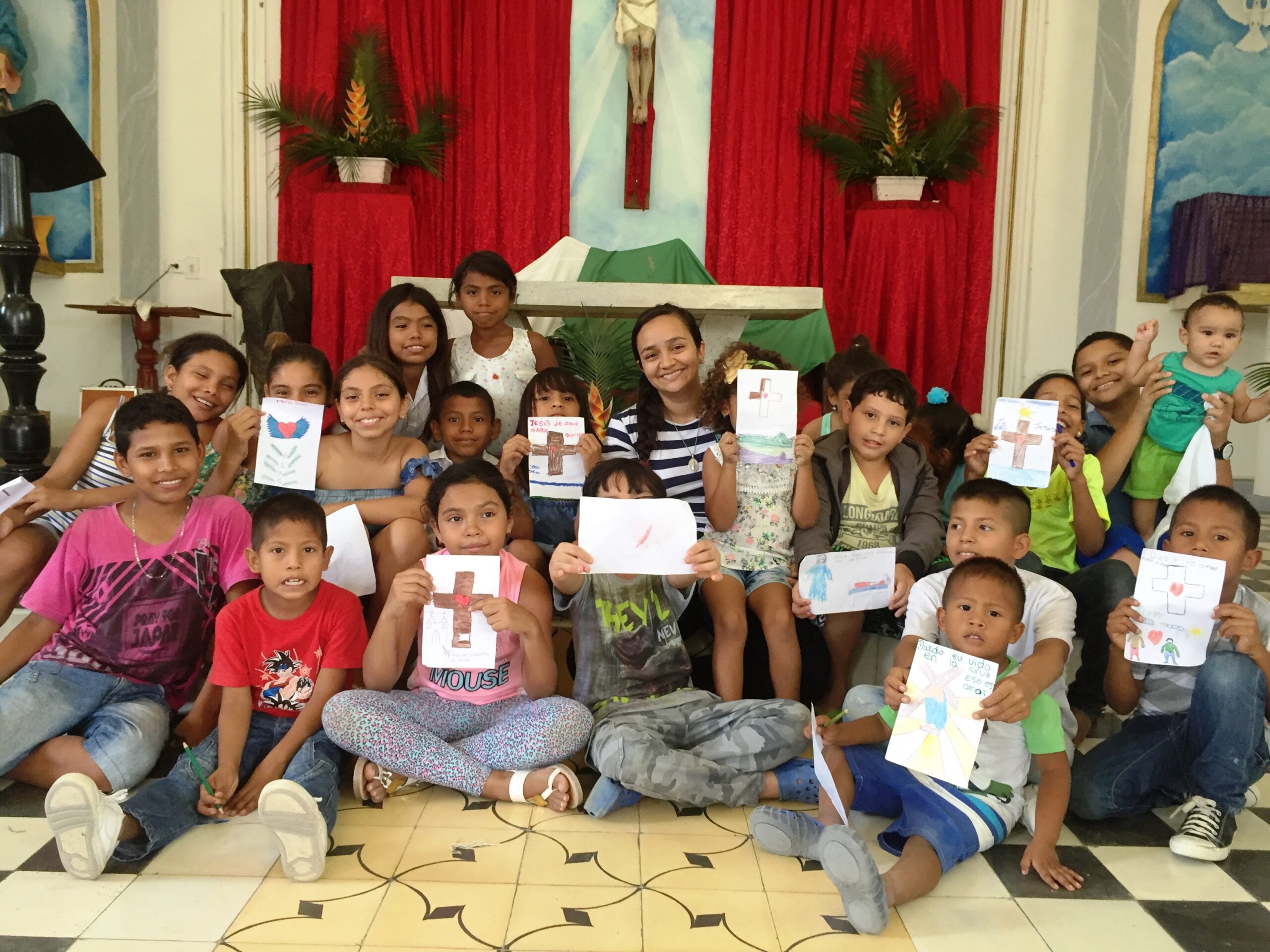The Catholic Church has always fostered a devotion to the Mater Dolorosa, or Sorrowful Mother. It is actually one of my favorite days of the year. The Tradition of honoring Our Lady of Sorrows is rooted in Scripture. In Genesis 3:15, God foretold Mary’s role in salvation history as He addressed Satan, “I will put enmity between you and the woman, and between your offspring and hers; He will strike at your head, while you strike at his heel” (Genesis 3:15). After the fall of Adam and Eve, God promised to send a savior to redeem mankind from their sins. With this, He immediately included the Blessed Mother in this promise by saying that she would oppose the devil along with her Son. This is the first instance of Mary’s intimate participation in her Son’s Passion. Isaiah 53:5 prophesized Christ’s future suffering as a physical one, but we know that Mary’s participation is spiritual and emotional. However, any parent knows that the sword of anguish can be just as piercing as a physical sword. In the book of 1 Maccabees, a woman witnesses her seven sons being martyred. This imagery gives us a glimpse of the pain Mary will feel as her Son is killed. God uses this immense love between a mother and a son to measure the grief that one will have upon beholding Him who has been sacrificed, as we see in today’s Gospel.
Mary’s sorrowful journey began with the ridicule she felt as an unmarried pregnant woman, continued through the poverty of Jesus’ birth, reappeared when Herod sought his life, extended when Mary thought she lost her son for a day in Jerusalem when He was 12 years old, and culminated as she stood underneath the cross as He gasped for air and breathed His last.
In many depictions of Our Lady of Sorrows, we see arrows piercing the Blessed Mother’s Heart. This imagery comes from Simeon’s warning during the Presentation in Luke 2:35, “And you yourself a sword will pierce so that the thoughts of many hearts may be revealed.”
In this passage, we find that the tradition of Our Lady of Sorrows intersects with another Marian belief: that of her participation in her Son’s Passion and cooperation in the redemption of humankind. Simeon tells Mary that she will experience a sword piercing her heart along with her son. The wording of this passage emphatically states that she will be intimately involved with her Son’s passion. He wasn’t saying it as a metaphor; he meant it quite literally. The pain Mary felt, beginning with her pregnancy and culminating as she watched Christ be crucified, was a very real, poignant sword, forged with the hatred and rejection of men towards Jesus. She pondered these words of Simeon for the 33 years leading up to her Son’s death. From her very conception she was chosen for this special role, and God set her aside for His Son. She would, in turn, suffer a spiritual martyrdom as her Son suffered a physical one.
Mary’s participation in the Passion of her Son has its source in her divine motherhood. In a 1997 general audience, Pope John Paul II references Lumen Gentium when he says, “By giving birth to the One who was destined to achieve man’s redemption, by nourishing him, presenting him in the temple and suffering with him as he died on the Cross, ‘in a wholly singular way she cooperated…in the work of the Saviour.’” Although we are all called to participate in the work of salvation through our suffering, Mary’s role in her Son’s Passion is unique and unrepeatable because of the maternal bond between her and her Son. The climax of Mary’s role as in her Son’s Passion takes place at the foot of the Cross, where the total suffering of her motherly heart was united to the suffering of her Son’s heart in fulfillment of the Father’s plan of redemption. As she looked upon her dying Son, the anguish she felt because of the sins of mankind was so strong that it literally pierced her heart as His was pierced with the lance. “These wounds which were scattered all over the body of Jesus, were all united in one heart of Mary” (St. Bonaventure). That is the proof of the strength of maternal love. Thus Simeon’s prophecy was fulfilled as Mary stood beside her dying Son at the foot of the cross, the true Mater Dolorosa.
“Mary meets her Son along the way of the Cross. His Cross becomes her Cross, his humiliation is her humiliation, the public scorn is on her shoulders. So it must seem to the people around her, and this is how her own heart reacts. The words spoken when Jesus was forty days old are now fulfilled. They are now completely fulfilled. And so, pierced by that invisible sword, Mary sets out towards her Son’s Calvary, her own Calvary. Although this pain is hers, striking deep in her maternal heart, the full truth of this suffering can be expressed only in terms of a shared suffering – ‘com-passion’. That word is part of the mystery; it expresses in some way her unity with the suffering of her Son” (St. Pope John Paul II).
Without Mary’s “fiat” to God, our redemption would not have occurred the way it did. Therefore, we can call her “Co-Redemptrix,” because her act of silent martyrdom and submission to the Will of God contributed to humanity’s ransom. Her sacrifice occurred through her compassion, (com-passio, to suffer with), which was the sword destined to pierce her heart. As Christ suffered in the flesh, Mary suffered in her heart. “The heart of Mary became as it were a mirror of the agonies of her Son, in which were seen the spitting, the scourging, the wounds, and all that Jesus suffered” (St. Lawrence Justinian).
Devotion to Mary as Mother of Sorrows is so incredibly important to the life of the Church, and why the Memorial of Our Lady of Sorrows is celebrated in our liturgical calendar on the day after the Feast of the Exaltation of the Cross. Oftentimes, Mary is overlooked or reduced to simply “blessed.” She was indeed Blessed, but, as we know in the Christian life, along with blessedness comes much pain. Mary revealed to St. Bridget, who coined the devotion to the Mater Dolorosa, that this grief which St. Simeon announced to her, never left her heart till she was assumed into heaven. She witnessed every word spoken against Christ, every time people chose and still choose today not to hear the word of Him who came to save them. As He was suffering, every blow and nail were driven into her heart; yet still she echoed her original “fiat,” in order that the salvation of man might be complete.
Our Mater Dolorosa had experienced the greatest of all sorrows, her heart had been pierced, and she felt utter abandonment and desolation. But like our Lady had always done, she kept the faith and accepted the will of God so completely and so perfectly. Our Mother chose trust. When nothing made sense, in the height of her agony, she kept her “yes.” She knew that God was good and worthy of thanks. If she could believe that during her bleakest hour, there is grace for us to believe it in ours. Pain has a way of making us feel isolated. But we are not alone. You are not alone. She suffers with us today. Who else would be a better companion, a better comforter, a better Mother than our own mother?
“Behold, your mother.” (John 19:27)
For some reason, I find the image of Our Lady crying extremely comforting to me. In times of my own sorrow, I cling to our Mother and allow her to cry with me. And I pray she lets me, unworthy though I be, bear her grief as well.
Contact the author
 Emily Jaminet is a Catholic author, speaker, radio personality, wife, and mother of seven children. She earned a bachelor’s degree in mental health and human services from the Franciscan University of Steubenville. She is the co-founder of www.inspirethefaith.com and the Executive Director of The Sacred Heart Enthronement Network www.WelcomeHisHeart.com. She has co-authored several Catholic books and her next one, Secrets of the Sacred Heart: Claiming Jesus’ Twelve Promises in Your Life, comes out in Oct. 2020. Emily serves on the board of the Columbus Catholic Women’s Conference, contributes to Relevant Radio and Catholic Mom.com.
Emily Jaminet is a Catholic author, speaker, radio personality, wife, and mother of seven children. She earned a bachelor’s degree in mental health and human services from the Franciscan University of Steubenville. She is the co-founder of www.inspirethefaith.com and the Executive Director of The Sacred Heart Enthronement Network www.WelcomeHisHeart.com. She has co-authored several Catholic books and her next one, Secrets of the Sacred Heart: Claiming Jesus’ Twelve Promises in Your Life, comes out in Oct. 2020. Emily serves on the board of the Columbus Catholic Women’s Conference, contributes to Relevant Radio and Catholic Mom.com.

 Shannon Whitmore currently lives in northwestern Virginia with her husband, Andrew, and their two children, John and Felicity. When she is not caring for her children, Shannon enjoys writing for her blog, Love in the Little Things, reading fiction, and freelance writing. She has experience serving in the areas of youth ministry, religious education, sacramental preparation, and marriage enrichment.
Shannon Whitmore currently lives in northwestern Virginia with her husband, Andrew, and their two children, John and Felicity. When she is not caring for her children, Shannon enjoys writing for her blog, Love in the Little Things, reading fiction, and freelance writing. She has experience serving in the areas of youth ministry, religious education, sacramental preparation, and marriage enrichment.
 Kathryn Mulderink, MA, is married to Robert, Station Manager for Holy Family Radio. Together they have seven children (including newly ordained Father Rob and seminarian Luke ;-), and two grandchildren. She is a Secular Discalced Carmelite and has published five books and many articles. Over the last 25 years, she has worked as a teacher, headmistress, catechist, Pastoral Associate, and DRE. Currently, she serves the Church as a writer and voice talent for Catholic Radio, by publishing and speaking, and by collaborating with the diocesan Office of Catechesis, various parishes, and other ministries to lead others to encounter Christ and engage their faith. Her website is
Kathryn Mulderink, MA, is married to Robert, Station Manager for Holy Family Radio. Together they have seven children (including newly ordained Father Rob and seminarian Luke ;-), and two grandchildren. She is a Secular Discalced Carmelite and has published five books and many articles. Over the last 25 years, she has worked as a teacher, headmistress, catechist, Pastoral Associate, and DRE. Currently, she serves the Church as a writer and voice talent for Catholic Radio, by publishing and speaking, and by collaborating with the diocesan Office of Catechesis, various parishes, and other ministries to lead others to encounter Christ and engage their faith. Her website is 
 Jeannette de Beauvoir is a writer and editor with the digital department of Pauline Books & Media, working on projects as disparate as newsletters, book clubs, ebooks, and retreats that support the apostolate of the Daughters of St. Paul at
Jeannette de Beauvoir is a writer and editor with the digital department of Pauline Books & Media, working on projects as disparate as newsletters, book clubs, ebooks, and retreats that support the apostolate of the Daughters of St. Paul at 
 Sarah Rose hails from Long Island and graduated from Franciscan University in 2016 with a Bachelor’s in Theology & Catechetics. She is happily married to her college sweetheart John Paul. They welcomed their first child, Judah Zion, in 2019. She is passionate about her big V-vocation: motherhood, and her little v-vocation: bringing people to encounter Christ through the true, the good, and the beautiful. She loves fictional novels, true crime podcasts/documentaries, the saints (especially Blessed Chiara Luce Badano), & sharing conversation over a good cup of coffee. She is currently the Coordinator of Young Adult Ministry at St. Cecilia Church in Oakley, Cincinnati. You can find out more about her ministry here:
Sarah Rose hails from Long Island and graduated from Franciscan University in 2016 with a Bachelor’s in Theology & Catechetics. She is happily married to her college sweetheart John Paul. They welcomed their first child, Judah Zion, in 2019. She is passionate about her big V-vocation: motherhood, and her little v-vocation: bringing people to encounter Christ through the true, the good, and the beautiful. She loves fictional novels, true crime podcasts/documentaries, the saints (especially Blessed Chiara Luce Badano), & sharing conversation over a good cup of coffee. She is currently the Coordinator of Young Adult Ministry at St. Cecilia Church in Oakley, Cincinnati. You can find out more about her ministry here: 

 J.M. Pallas has had a lifelong love of Scriptures. When she is not busy with her vocation as a wife and mother to her “1 Samuel 1” son, or her vocation as a public health educator, you may find her at her parish women’s bible study, affectionately known as “The Bible Chicks.”
J.M. Pallas has had a lifelong love of Scriptures. When she is not busy with her vocation as a wife and mother to her “1 Samuel 1” son, or her vocation as a public health educator, you may find her at her parish women’s bible study, affectionately known as “The Bible Chicks.”
 Merridith Frediani’s perfect day includes prayer, writing, unrushed morning coffee, reading, tending to dahlias, and playing Sheepshead with her husband and three kids. She loves finding God in the silly and ordinary. She writes for Ascension Press, Catholic Mom, and her local Catholic Herald in Milwaukee. Her first book Draw Close to Jesus: A Woman’s Guide to Eucharistic Adoration is expected to be released summer 2021. You can reach her at
Merridith Frediani’s perfect day includes prayer, writing, unrushed morning coffee, reading, tending to dahlias, and playing Sheepshead with her husband and three kids. She loves finding God in the silly and ordinary. She writes for Ascension Press, Catholic Mom, and her local Catholic Herald in Milwaukee. Her first book Draw Close to Jesus: A Woman’s Guide to Eucharistic Adoration is expected to be released summer 2021. You can reach her at 
 Tami Urcia grew up in Western Michigan, a middle child in a large Catholic family. She spent early young adulthood as a missionary in Mexico, studying theology and philosophy, then worked and traveled extensively before finishing her Bachelor’s Degree in Western Kentucky. She loves tackling home improvement projects, finding fun ways to keep her four boys occupied, quiet conversation with the hubby and finding unique ways to love. She works at Diocesan, is a guest blogger on
Tami Urcia grew up in Western Michigan, a middle child in a large Catholic family. She spent early young adulthood as a missionary in Mexico, studying theology and philosophy, then worked and traveled extensively before finishing her Bachelor’s Degree in Western Kentucky. She loves tackling home improvement projects, finding fun ways to keep her four boys occupied, quiet conversation with the hubby and finding unique ways to love. She works at Diocesan, is a guest blogger on 
 Sheryl O’Connor delights in being the number 1 cheerleader and supporter for her husband, Tom who is a candidate for the Permanent Diaconate in the Diocese of Kalamazoo. They are so grateful for the opportunity to grow together in this process whether it is studying for classes, deepening their prayer life or discovering new ways to serve together. Sheryl’s day job is serving her community as the principal for St. Therese Catholic School in Wayland, Michigan. Since every time she thinks she gets life all figured out, she realizes just how far she has to go, St. Rita of Cascia is her go-to Saint for intercession and help. Home includes Brea, a Bernese Mountain dog and Carlyn, a very, very goofy Golden Retriever.
Sheryl O’Connor delights in being the number 1 cheerleader and supporter for her husband, Tom who is a candidate for the Permanent Diaconate in the Diocese of Kalamazoo. They are so grateful for the opportunity to grow together in this process whether it is studying for classes, deepening their prayer life or discovering new ways to serve together. Sheryl’s day job is serving her community as the principal for St. Therese Catholic School in Wayland, Michigan. Since every time she thinks she gets life all figured out, she realizes just how far she has to go, St. Rita of Cascia is her go-to Saint for intercession and help. Home includes Brea, a Bernese Mountain dog and Carlyn, a very, very goofy Golden Retriever.